Comprehensive Measures to Support People with Developmental Disabilities by Life-Cycle Phase for an “Inclusive State for Everyone”
- Regdate2018-12-13 15:07
- Hit379
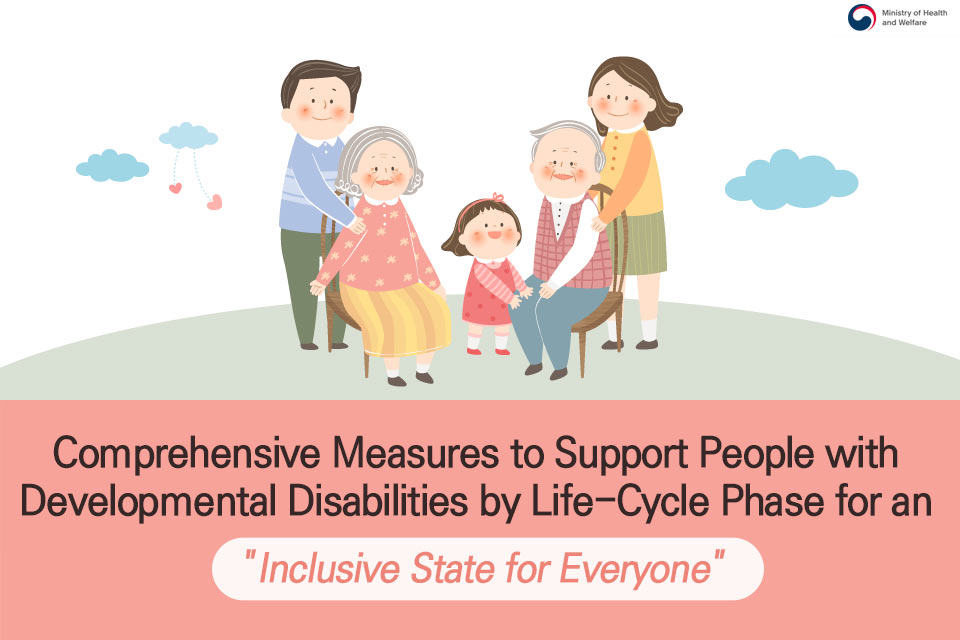
Comprehensive Measures to Support People with Developmental Disabilities by Life-Cycle Phase for an Inclusive State for Everyone (1/8)
Comprehensive Measures to Support People with Developmental Disabilities by Life-Cycle Phase for an Inclusive State for Everyone
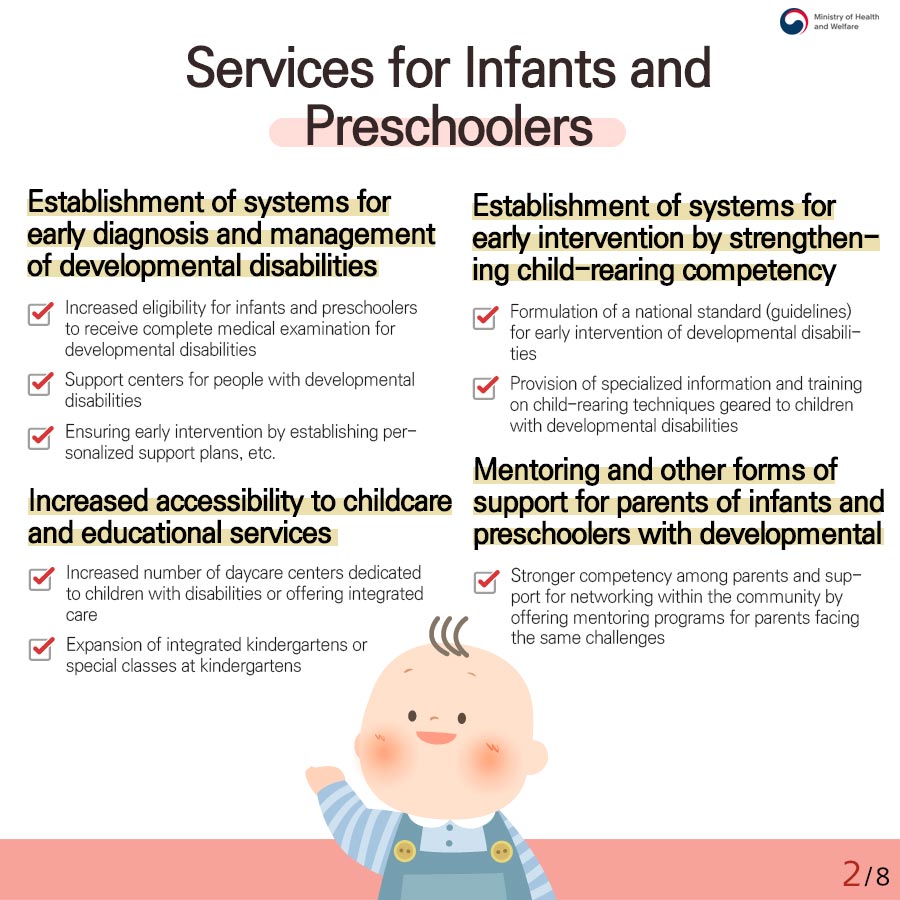
Services for Infants and Preschoolers(2/8)
Establishment of systems for early diagnosis and management of developmental disabilities
- Increased eligibility for infants and preschoolers to receive complete medical examination for developmental disabilities
- Support centers for people with developmental disabilities
- Ensuring early intervention by establishing personalized support plans, etc
Increased accessibility to childcare and educational services
- Increased number of daycare centers dedicated to children with disabilities or offering integrated care
- Expansion of integrated kindergartens or special classes at kindergartens
Establishment of systems for early intervention by strengthening child-rearing competency
- Formulation of a national standard (guidelines) for early intervention of developmental disabilities
- Provision of specialized information and training on child-rearing techniques geared to children with developmental disabilities
Mentoring and other forms of support for parents of infants and preschoolers with developmental disabilities
- Stronger competency among parents and support for networking within the community by offering mentoring programs for parents facing the same challenges
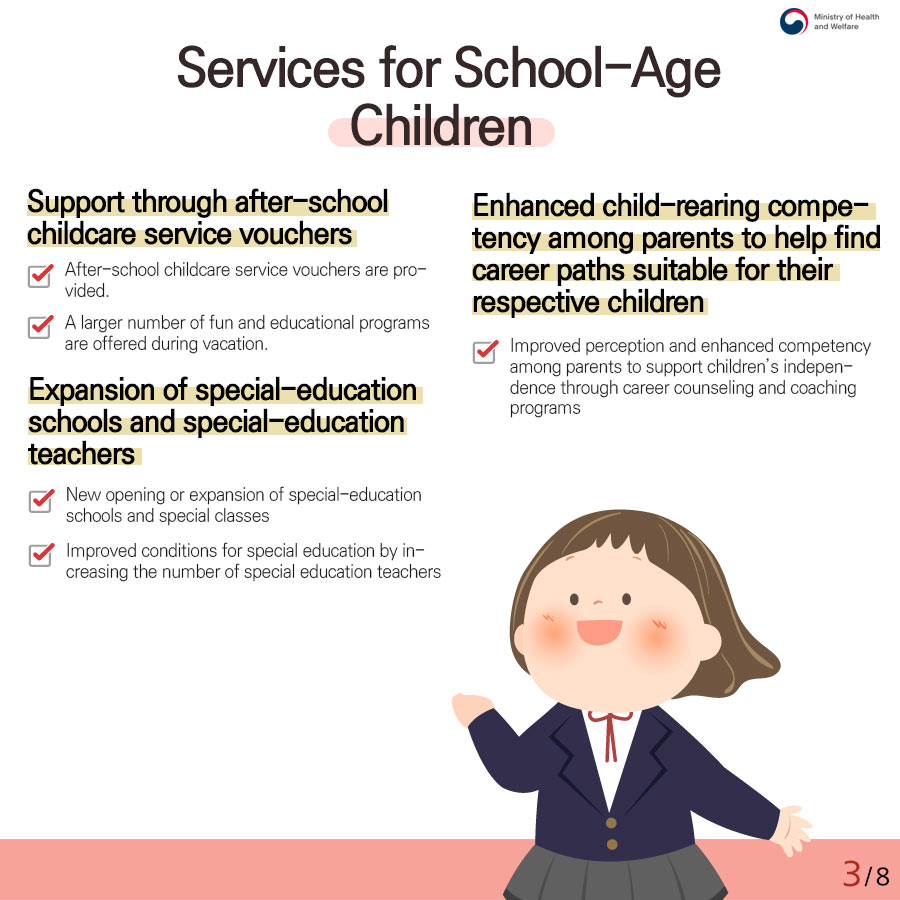
Services for School-Age Children (3/8)
Support through after-school childcare service vouchers
- After-school childcare service vouchers are provided.
- A larger number of fun and educational programs are offered during vacation.
Expansion of special-education schools and special-education teachers
- New opening or expansion of special-education schools and special classes
- Improved conditions for special education by increasing the number of special education teachers
Enhanced child-rearing competency among parents to help find career paths suitable for their respective children
- Improved perception and enhanced competency among parents to support children’s independence through career counseling and coaching programs
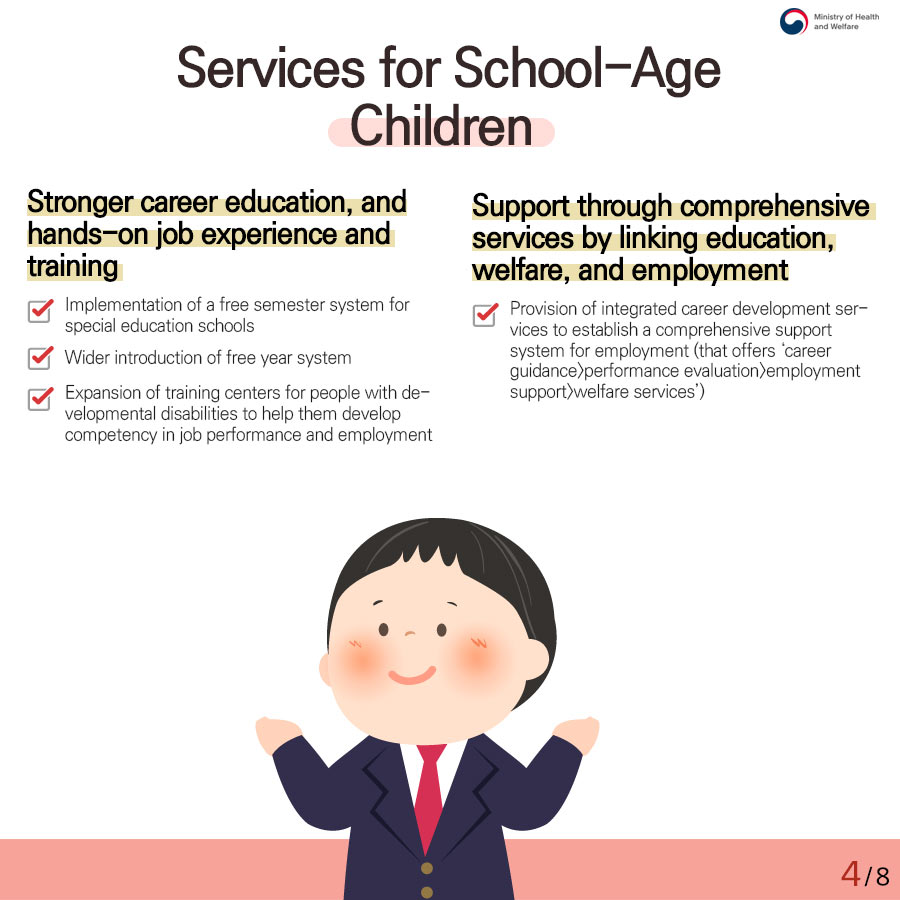
Services for School-Age Children (4/8)
Stronger career education, and hands-on job experience and training
- Implementation of a free semester system for special education schools
- Wider introduction of free year system
- Expansion of training centers for people with developmental disabilities to help them develop competency in job performance and employment
Support through comprehensive services by linking education, welfare, and employment
- Provision of integrated career development services to establish a comprehensive support system for employment
(that offers 'career guidance>performance evaluation>employment support>welfare services')
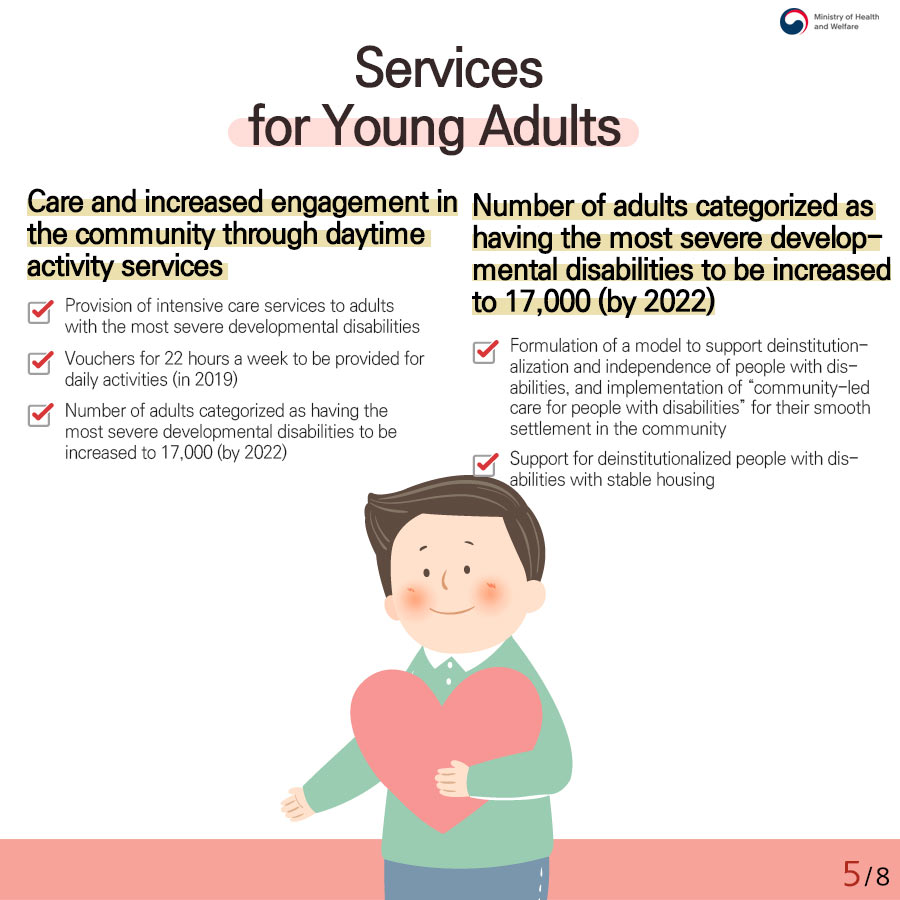
Services for Young Adults (5/8)
Care and increased engagement in the community through daytime activity services
- Provision of intensive care services to adults with the most severe developmental disabilities
- Vouchers for 22 hours a week to be provided for daily activities (in 2019)
- Number of adults categorized as having the most severe developmental disabilities to be increased to 17,000 (by 2022)
Support for people with developmental disabilities at care facilities for deinstitutionalization and independent living
- Formulation of a model to support deinstitutionalization and independence of people with disabilities, and implementation of "community-led care for people with disabilities" for their smooth settlement in the community
- Support for deinstitutionalized people with disabilities with stable housing
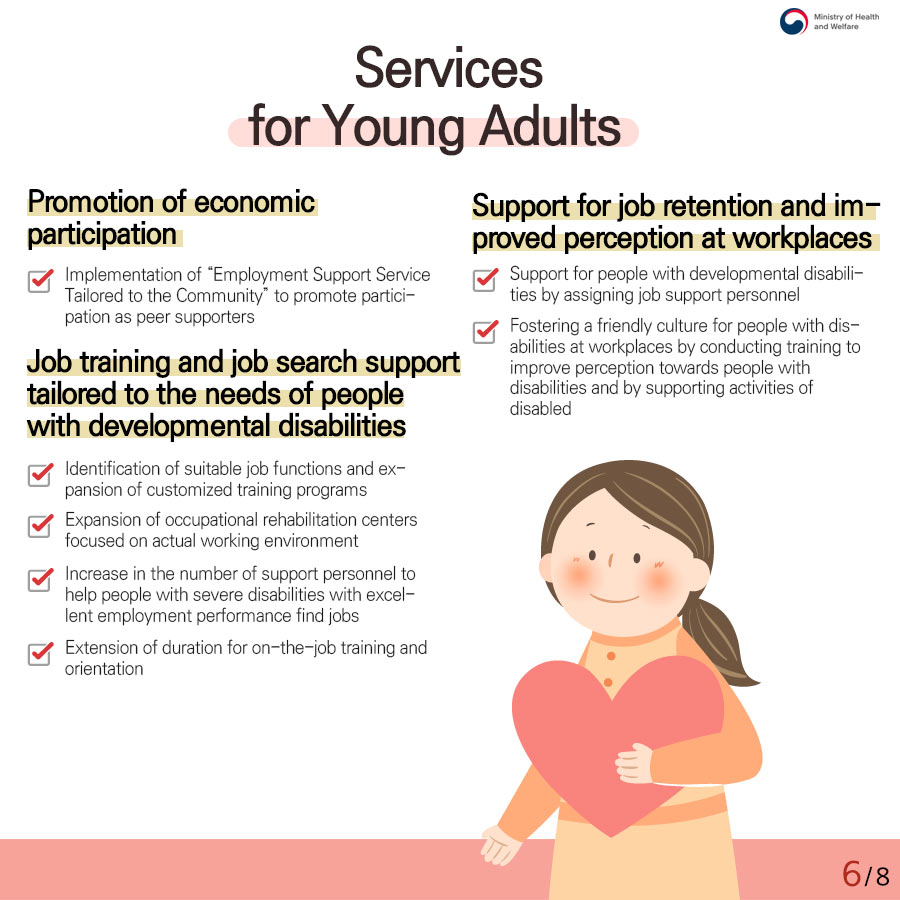
Services for Young Adults (6/8)
Promotion of economic participation
- Implementation of "Employment Support Service Tailored to the Community" to promote participation as peer supporters
Job training and job search support tailored to the needs of people with developmental disabilities
- Identification of suitable job functions and expansion of customized training programs
- Expansion of occupational rehabilitation centers focused on actual working environment
- Increase in the number of support personnel to help people with severe disabilities with excellent employment performance find jobs
- Extension of duration for on-the-job training and orientation
Support for job retention and improved perception at workplaces
- Support for people with developmental disabilities by assigning job support personnel
- Fostering a friendly culture for people with disabilities at workplaces by conducting training to improve perception towards people with disabilities and by supporting activities of disabled instructors
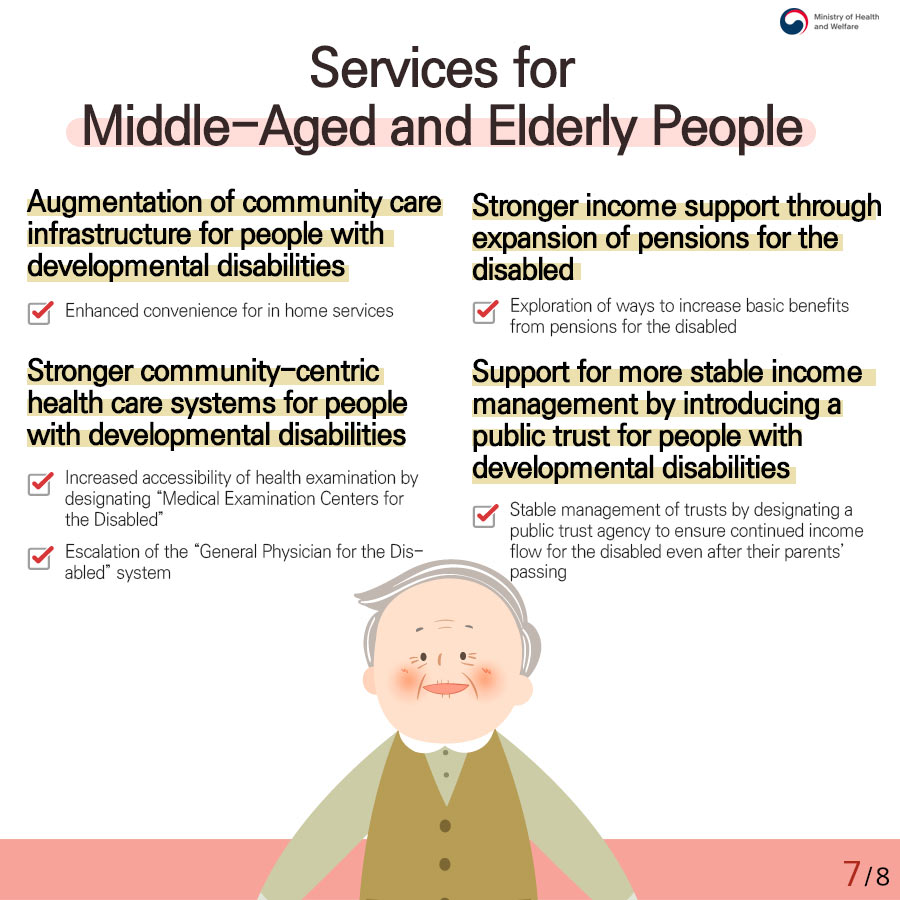
Services for Middle-Aged and Elderly People (7/8)
Augmentation of community care infrastructure for people with developmental disabilities
- Enhanced convenience for in home services
Stronger community-centric health care systems for people with developmental disabilities
- Increased accessibility of health examination by designating "Medical Examination Centers for the Disabled"
- Escalation of the "General Physician for the Disabled" system
Stronger income support through expansion of pensions for the disabled
- Exploration of ways to increase basic benefits from pensions for the disabled
Support for more stable income management by introducing a public trust for people with developmental disabilities
- Stable management of trusts by designating a public trust agency to ensure continued income flow for the disabled even after their parents’ passing
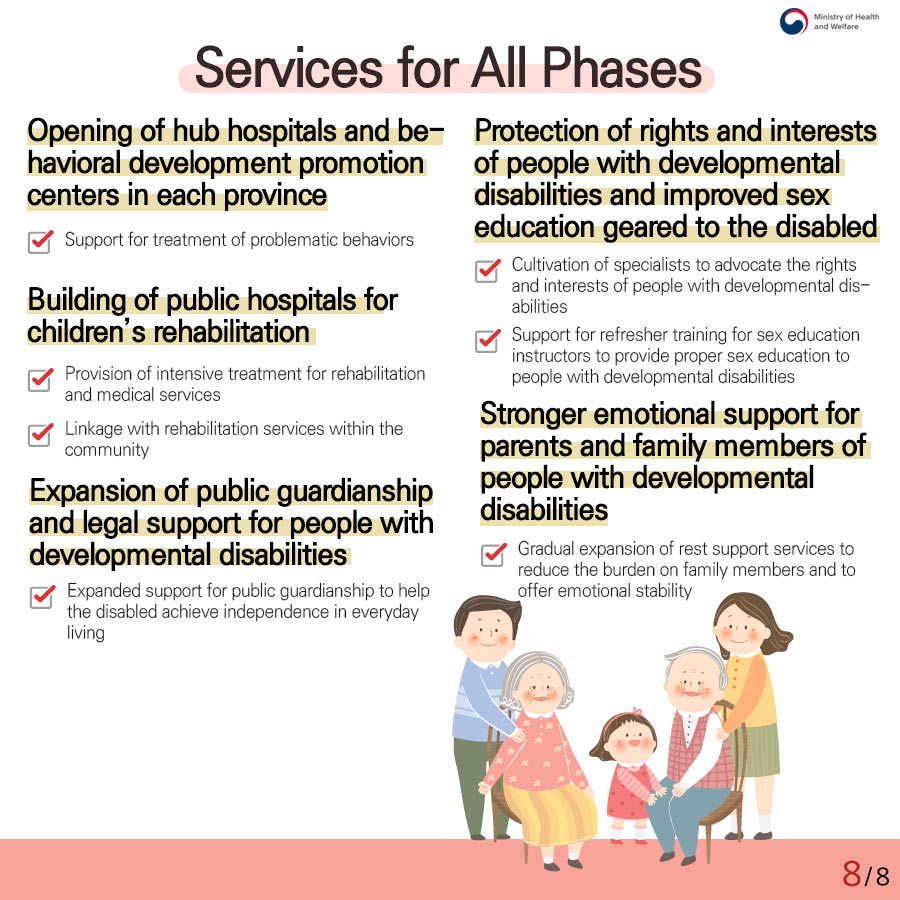
Services for All Phases(8/8)
Opening of hub hospitals and behavioral development promotion centers in each province
- Support for treatment of problematic behaviors
Building of public hospitals for children’s rehabilitation
- Provision of intensive treatment for rehabilitation and medical services
- Linkage with rehabilitation services within the community
Expansion of public guardianship and legal support for people with developmental disabilities
- Expanded support for public guardianship to help the disabled achieve independence in everyday living
Protection of rights and interests of people with developmental disabilities and improved sex education geared to the disabled
- Cultivation of specialists to advocate the rights and interests of people with developmental disabilities
- Support for refresher training for sex education instructors to provide proper sex education to people with developmental disabilities
Stronger emotional support for parents and family members of people with developmental disabilities
- Gradual expansion of rest support services to reduce the burden on family members and to offer emotional stability